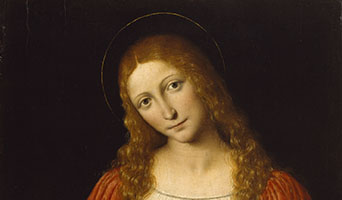WelCom June/July 2021
John 20:1-2, 11-18
Image: Mary Magdalene, c 1524, painting by Andrea Solario or Bernardino Luini, Walters Art Museum/Wikimedia Commons.
Elizabeth Julian rsm
So much weeping! Poor Mary Magdalene!
Weeping, turning, announcing. Three verbs lie at the heart of this highly significant passage about Jesus’ encounter with a distraught Mary Magdalene in the garden. While it is proclaimed on her feast day (22 July), we don’t hear it on any Sunday between Easter and Pentecost where it logically fits.
But we can’t forget this Mary, the one who stayed the distance during Jesus’ public ministry as one of his faithful disciples. A witness at the foot of the cross during the crucifixion, she was one of the women who brought spices to anoint Jesus’ body but discovered the tomb empty. According to John’s account, it’s Mary Magdalene alone who was the first witness to the resurrection and the first to be commissioned to tell of it.
In this account, Mary looks into the tomb through her tears. Unsurprised by the presence of two angels and still weeping she turns and sees Jesus. Addressing her as ‘woman’ Jesus asks why she is weeping and who she is looking for. Thinking he is the gardener, it’s only when Jesus calls her name that she turns and recognises him. So, Mary turns twice. Perhaps the second turn – since she was already facing Jesus – was a symbolic turning, a turning away from an old understanding of Jesus. Mary must not cling or hold on to that idea but instead go and tell or announce to the disciples that he is alive. He is now to be found in the community of his brothers and sisters.
So weeping, turning, announcing. What do they mean for us today?
What makes us weep? What of all the sad and tragic situations in our own lives, in our community and throughout the world today, makes us weep the most? What do we see through our tears? Who are we looking for? Is it Jesus or something else? Will we recognise Jesus when he calls our name today? When we turn around today where will we see him? And who will we tell through our words and actions? Will they believe us? What old idea of Jesus do we or the institutional church have to turn away from? One commentator suggests that Mary’s words, ‘They have taken away my Lord, and I don’t know where they put him,’ describes the Church’s resistance to women as preachers or as qualified to share fully in the governance and liturgical life of the Catholic community. What would Mary herself say about that? What would Martha whose feast we celebrate 29 July say? After all she gave the same testimony of faith (John 11:27) as Peter in the Synoptics.
So much to weep about!
